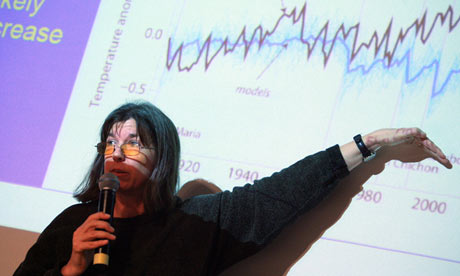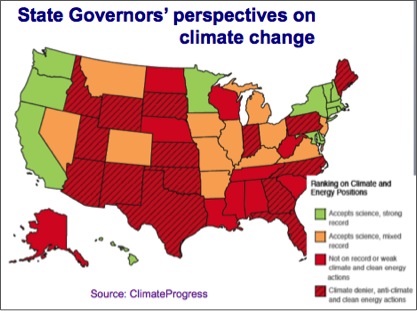Lord Lawson’s climate denial charity, the Global Warming Policy Foundation (GWPF), invited climate sceptic Judith Curry, a professor of School of Earth and Atmospheric Sciences at the Georgia Institute of Technology, to speak in the House of Lords on Monday.
The organisation, which DeSmog UK has revealed to be supported by several Conservative Party donors, invited Curry to talk about the “The state of the US climate debate”.
Curry, who has been invited several times by Republicans to testify at climate change hearings regarding alleged uncertainties on manmade climate change, focused on how the climate debate has been politicised and that science has been “caught in the crossfire” leading to “oversimplification” of the problem of and solutions to climate change.
According to her presentation notes, her main message was to emphasise the uncertainty in the climate change science: one that she echoes on her blog Climate Etc. “The punch line is this,” she said in the House of Lords, “Any impact of human caused global warming is lost in the noise of climate variability.”
Describing her doubts about the science as “motherhood and apple pie statements,” she told those attending that “with time, I have become increasingly sceptical of the IPCC [Intergovernmental Panel on Climate Change] conclusions on climate change and critical of their entire approach – most particularly their overconfidence and intolerance of dissent.”
In addition to writing on her own blog, Curry is a regular commentator at Anthony Watts’s denier blog, as well as Climate Audit, set up by Steve McIntyre – one of the original critics of Michael Mann’s hockey stick graph.
Among the sources cited in Curry’s presentation is the CATO Institute, a Libertarian think tank founded by Charles Koch.
Ties to GWPF
Her last significant link with the GWPF was when she decided to write the foreword for Lewis and Krok’s GWPF report, entitled “A Sensitive Matter: How the IPCC Buried Evidence Showing Good News About Global Warming”.
Commenting on her decision to support the GWPF’s report, she wrote on her blog: “I did think twice about writing a foreword for a GWPF publication. I try to stay away from organizations with political perspectives on global warming.
“That said, GWPF has done some commendable things, notably pushing for inquiries into the Climategate affair. And there really are very few options for publishing a report like this. I think it is important to put forward alternative assessments of the key elements of the climate change debate.”
State of the Debate
During her talk on Monday night, Curry analysed President Obama’s methods and tactics to push the climate change agenda, given the number of climate deniers in congress and the senate.
(Slide from presentation)
In order to do this, she claimed that the president has done four things.
Firstly, Obama has emphasised the long-term social costs of carbon. She believes the cost-benefit analysis of the long-term impacts of carbon emissions are “highly uncertain and contested”.
Instead, she claimed that the known high costs of acting on climate change now will “damage the economy and development”.
This echoes a newly-popularised PR line, developed by coal giant Peabody Energy, that fossil fuels are vital for alleviating poverty and economic growth in developing countries. The climate sceptic community has increasingly picked up this argument: most recently at last week’s climate denial conference hosted by the fossil fuel-funded Heartland Institute.
Secondly, Curry showed how Obama has often linked extreme events, in particular hurricanes, to climate change. She argued that this link is not supported by existing science. (The one scientist she cites in her presentation on this point, Chris Landsea, resigned from the IPCC in protest.)
Thirdly, Curry was critical of Obama’s attempts to underline the public health benefits associated with carbon reduction.
She said: “The fact of the matter is that carbon dioxide does not impact air quality and breathing. U.S. air quality (ozone and particulates) has improved substantially over the past 3 decades.” Her presentation notes did not cite a source for this claim.
And finally, she claimed that Obama’s identification of climate change as a threat to the US’s national security interests is exaggerated.
Influential Foe
Curry praised Texas Republican Lamar Smith, chair of the House Committee on Science, Space and Technology as “the most influential of President Obama’s foes in the House of Representatives on the climate change issue.”
Speaking at the Heartland Institute’s climate denial conference in Washington, DC last week, Smith declared war on climate science research. His commitment to cutting NASA’s earth science budget by 40 percent was met with applause from the audience.
Curry then went on to list many of the Republican presidential candidates’ views on climate change. She claimed that the portrayal of their views by the “liberal media” was unfair and “cartoonish”, when in fact they were legitimate disagreements with the consensus on climate change.
Curry failed to mention the issue of the fossil fuel industry lobby, and its potential influence on US politics or any of the Republican candidates mentioned.
‘Consequential Uncertainties’
Curry did acknowledge that the majority of climate scientists support the IPCC perspective, citing recent surveys on scientists which suggested that 52–85 percent of climate scientists agree with the IPCC.
However, she was keen to emphasise doubt on this consensus and pushed her view that we should focus on climate variability over manmade climate change.
“None of the most consequential scientific uncertainties are going to be resolved any time soon; there is a great deal of work still to do to understand climate change. And there is a growing realization that unpredictable natural climate variability is important.”
“I regard climate change as a wicked mess. A wicked mess is a complex problem with multiple dimensions and interrelated issues, with suboptimal solutions that create additional problems.”
According to her blog, she was meant to meet with the BBC’s Andrew Neil while in the UK, but this event was later cancelled. She is now expected to talk next week at the ‘Circling the Square’ conference in Nottingham.
@benjameslucas
Photo: Mercer University
Subscribe to our newsletter
Stay up to date with DeSmog news and alerts








